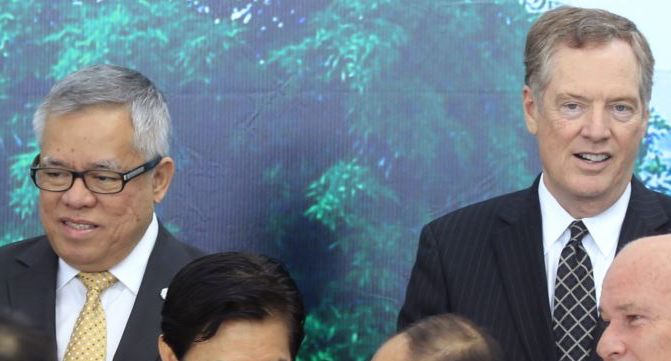Philippines and US aim to announce free trade talks in November

Nikkei Asian Review | 10 October 2018
Philippines and US aim to announce free trade talks in November
by CLIFF VENZON
MANILA — The U.S. and the Philippines plan to announce the start of their free trade negotiations by next month as the two allies look to bolster their economic relationship amid uncertainty over security ties.
"We will have to meet up with the U.S. trade representative to have a joint declaration" on starting the talks, Philippine Trade Secretary Ramon Lopez told the Nikkei Asian Review on Wednesday. "I think that will kick off the process of getting [U.S.] congressional approval."
If completed, a free trade agreement with the Philippines will be the U.S.’ second in Southeast Asia after one with Singapore.
The move toward starting talks comes after both sides resolved issues around a Trade and Investment Framework Agreement, including those related to e-commerce, Lopez said in an interview.
The talks, which could last one to three years, are part of U.S. President Donald Trump’s strategy to pursue bilateral rather than multilateral trade agreements to let Washington secure the best possible deal.
The U.S. ranks among the Philippines’ major trading partners. In 2017, bilateral trade totaled around $20 billion, with the U.S. registering a $3.2 billion trade deficit, according to the Census Bureau. The Trump administration has been tough in trade negotiations, but Lopez is upbeat on a win-win deal. "I don’t think they will be hard on us," he said.
For the Philippines, a free trade agreement with the U.S. would upgrade the current Generalized System of Preferences scheme wherein the U.S. reviews zero-tariff privileges given to more than 3,000 Philippine products every three years.
"The benefit is that an FTA will give us a longer-term horizon as far as the trade relationship with the U.S. is concerned," Lopez said. "In other words, it’s a more permanent trading arrangement."
Lopez said he plans to push footwear and garments as duty-free goods under the FTA. Manila aims to revive the country’s garment industry, which was dealt a blow in 1995 by the phaseout of a quota system that guaranteed a market for Philippine exports.
"We used to have that quota with the U.S., [which] was already removed, so we want to bring back... the garments industry," Lopez said.
The U.S., according to Lopez, wants to export more agricultural products to the Philippines, which ties in with President Rodrigo Duterte’s recent policy of liberalizing food imports to rein in stubbornly high inflation.
The Philippines has been largely spared the harm of the U.S.-China trade war, and Manila hopes the country will be the destination for Asian companies seeking greater access to the U.S. market. "Any discussion in this regard will in effect be a great move and [provide] insulation also from trade tensions between these two giant economies," Lopez said.
Lopez said Duterte’s meeting with Trump in November 2017 fast-tracked negotiations.
"The Philippines has been a strong ally [of the U.S.] historically and in the Indo-Pacific. And right now, our two leaders get along very well," Lopez said.
The FTA could help rebuild Manila-Washington ties that were damaged by then-President Barack Obama’s criticism of Duterte’s brutal drug war. Duterte, who had publicly blasted Obama, has since moved closer to China to secure more economic concessions.
The Philippine leader has ordered the Philippine military to reduce engagement with U.S. forces, while toning down criticism of Beijing’s expansion in the South China Sea.
But Lopez said a trade deal with the U.S., Manila’s former colonial power, will not harm relations with Beijing. "We have adopted that policy that [the] Philippines will be friend to all and enemy to no one," Lopez said.
The trade official said the Philippines is a committed party to the Regional Comprehensive Economic Partnership, an Asia-Pacific multilateral trade pact that includes China, India and Japan.
Under Trump, the U.S. has backed out of the Trans-Pacific Partnership trade and investment agreement and unbundled the North American Free Trade Agreement by negotiating separately with Canada and Mexico. The recent deal with Ottawa is widely seen as a victory for Trump, who plans to commence trade talks with Japan next.





